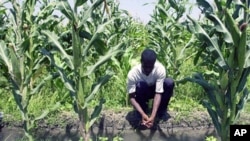Two weeks after Haiti's earthquake, the international community is beginning to focus on long-term aid for the devastated nation. International donors are meeting in Montreal, Monday. A United Nations agency is calling on international donors to focus on rebuilding Haiti's agriculture.
Relief efforts continue in Haiti, as food aid, rescuers and medical teams still flood into the devastated island nation. But the focus is shifting to how to rebuild the impoverished country.
According to the Rome-based International Fund for Agricultural Development, agriculture needs to be on top of this agenda. That is the message IFAD President Kanayo Nwanze plans to take to top business leaders and politicians meeting in Davos, Switzerland, later this week.
"Haiti's agriculture, which sustains the majority of the population, is crucial for the long-term development of the country," he stressed. "Assistance to Haiti for long-term development will provide the opportunities for them to grow their own food, as much as possible, and not be too dependent on imported food," he said.
Speaking by Internet link, Nwanze told reporters that focusing on Haiti's agricultural production is particularly critical now, as Haitians flee the quake-hit capital Port-au-Prince for the countryside.
Nwanze says, the United States -- one of the main donor countries -- is already beginning to shift its focus to rural development.
"The U.S. has certainly made it known that it is committed to both the reconstruction and long-term rehabilitation of Haiti," said Nwanze. "I believe one of those [efforts] would be assisting the Haitians, themselves, to be able to grow enough food and be able to reduce their dependency on imports," he said.
But the track record has not been good. The share of foreign aid earmarked for agriculture in Haiti dropped from 18 percent in the 1980's to less than four percent in 2007. Only recently has it rebounded, after the spike in world food prices. But even before the quake, 80 percent of Haiti's food was imported.
Nwanze says that IFAD and two other U.N. agencies -- the World Food Program and the Food and Agricultural Organization -- will begin this week to assess the impact of Haiti's earthquake on rural areas, as a first step to a longer-term development strategy.




